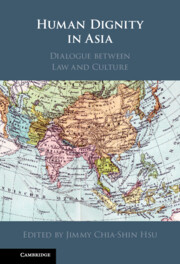Book contents
- Human Dignity in Asia
- Human Dignity in Asia
- Copyright page
- Dedication
- Contents
- Editor and Contributors
- Preface
- Abbreviations
- Introduction Human Dignity, Human Rights, and Cultural Change in Asia
- 1 Human Dignity in Indian Constitutional Adjudication
- 2 The Development of Individual Dignity in Japan
- 3 Constitutional Discourse on Human Dignity in South Korea
- 4 Human Dignity in the Jurisprudence of the Taiwan Constitutional Court
- 5 The Human Dignity Factor
- 6 Human Dignity in the Jurisprudence of the Indonesian Constitutional Court
- 7 Dignity as a Constitutional Value in Hong Kong
- 8 Human Dignity and Relational Constitutionalism in Singapore
- 9 Personal Dignity under Chinese
- 10 Virtue, Dignity, and Constitutional Democracy
- 11 Buddhist Philosophical Approaches to Human Dignity
- 12 Dignity and Status in Ancient and Medieval India
- 13 Human Dignity, Pancasila, and Islam
- 14 Catholicism and Human Dignity in the Philippines
- 15 Protestantism and Human Dignity in South Korea
- Index
11 - Buddhist Philosophical Approaches to Human Dignity
Published online by Cambridge University Press: 26 July 2022
- Human Dignity in Asia
- Human Dignity in Asia
- Copyright page
- Dedication
- Contents
- Editor and Contributors
- Preface
- Abbreviations
- Introduction Human Dignity, Human Rights, and Cultural Change in Asia
- 1 Human Dignity in Indian Constitutional Adjudication
- 2 The Development of Individual Dignity in Japan
- 3 Constitutional Discourse on Human Dignity in South Korea
- 4 Human Dignity in the Jurisprudence of the Taiwan Constitutional Court
- 5 The Human Dignity Factor
- 6 Human Dignity in the Jurisprudence of the Indonesian Constitutional Court
- 7 Dignity as a Constitutional Value in Hong Kong
- 8 Human Dignity and Relational Constitutionalism in Singapore
- 9 Personal Dignity under Chinese
- 10 Virtue, Dignity, and Constitutional Democracy
- 11 Buddhist Philosophical Approaches to Human Dignity
- 12 Dignity and Status in Ancient and Medieval India
- 13 Human Dignity, Pancasila, and Islam
- 14 Catholicism and Human Dignity in the Philippines
- 15 Protestantism and Human Dignity in South Korea
- Index
Summary
Human rights/dignity can be grounded in Buddhism as part of the freedom of human beings to liberate themselves from suffering. But there are markedly different approaches to this freedom in various Buddhisms. In early Buddhism, dignity can be seen as a worth that arises intrinsically due to the ability of each individual to free oneself from suffering. In Nishitani Keiji’s philosophy of Zen, dignity is an ability to free everyone from an ontologically shared suffering, as in Thich Nhat Hanh’s engaged Buddhism. Next, the chapter examines two very common forms of Buddhism that are often neglected in rights/dignity discourses – salvific Buddhism (Pure Land) and Confucian Buddhism. In Tanabe Hajime’s view of salvific Buddhism, “dignity”is not about attaining freedom oneself but about one’s being saved by absolute other power and being a mediator for that salvation. In Watsuji Tetsurō’s Confucian Buddhism, dignity is seen as the potential to be free from one’s egotism for the sake of serving one’s community. All of these show markedly different moral approaches to human dignity – and Sueki Fumihiko warns us not to miss the trans-ethical side of these Buddhisms.
Keywords
- Type
- Chapter
- Information
- Human Dignity in AsiaDialogue between Law and Culture, pp. 269 - 284Publisher: Cambridge University PressPrint publication year: 2022

